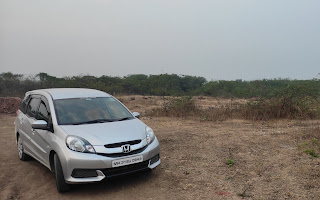The Long Road Trip Project
‘The trip was so hectic!’ screamed my wife after a 750 km long trip from Nagpur.
‘But you were just sitting in the car comfortably. It was me who was driving,’ I said.
‘What do you mean? Even sitting in a moving vehicle for 16 hours causes fatigue. Haven’t you heard of jetlag?’ My wife quipped and I was speechless like a project manager who gets a sermon from the executive sponsor over a slight delay in the schedule of the project delivered within the budget and scope.
The journey from Nagpur to Pune should ideally take 14 hours with a constant speed of 60 km/hr and a break of an hour for breakfast and lunch. But it had taken 2 hours extra due to a patch of bad road and traffic at Aurangabad and Ahmednagar. In reality, termed as living order in project management, such delay in schedule, overshooting of budget and scope evolution or scope creep has to be envisaged. So, for me, the long road trip from Nagpur to Pune was no less than a project that defies the Geometric order. Although I had been driving on this route since 2012, every trip seems to be different, as no two projects are the same. And this trip was on a festive occasion, so there had to be some scope alteration. The budget had already increased due to the hike in fuel prices as compared with the previous trips, so, we couldn’t afford any contingencies in this long journey. In the project initiation stage, while planning the trip, we had to get the servicing of the car done ensuring optimum nitrogen pressure in the tyres. So, on the previous day, we had to prepare for any emergencies or scope creep.
I still remember our second trip to Pune in the year 2012, when both the tyres of our car became flat on the way, and getting it fixed took more than two hours. Because it was Maharashtra Bandh on that day due to the death of a prominent leader of Maharashtra. This scope creep caused a major delay in reaching Pune. Such experiences are the learnings that prepare you for the alteration. Learning through education in terms of research about the route and area also makes you prepared for the change. Research says that 65% of projects fail due to this along with the project sponsors’ inability to deal with the change. So, Project Managers need to be prepared for change, as a project is anything that deals with change. If there is highway construction, the Project Manager who is a driver, in this case, can find a way on the small roads. Also, if the driver hears a noise coming from the engine compartment, he can decide to stop at the next service station, which might delay the trip a bit, but also might avoid a disaster.
However, while executing any project you need clarity on the scope and purpose. Similarly, while a long trip, you need clarity of vision on road. This gives you control over the speed and thus the schedule. Also, during a road trip, you need to define the milestones in terms of places with reference to the time, as you need to define important milestones while executing a project. Milestones provide important and visible markers that a phase has been completed or that a new phase is about to start. The milestones enable you to generate and assure progress against your Schedule. Accordingly, you may benchmark certain co-travellers on the route and match their speed if not overtake them. This will ensure the delivery of the project in time.
Hope this analogy of a project with a long road trip helps any layman understand project management without
going into the technicalities.




Comments
Some key success factors are - start with MVP (minimum viable product) roadmap for any product/project, further progress with incremental approach, regularly keeping tab on the progress of project to uncover risks at early stage. Most important is people so team should be given freedom and self-organized.